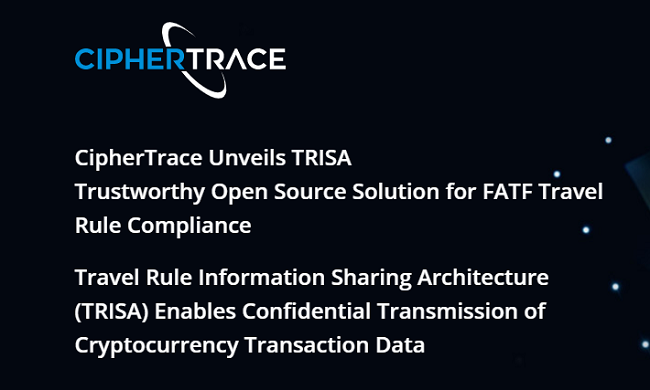Crypto intelligence firm CipherTrace has announced a new solution to assist cryptocurrency exchanges to comply with the FATF’s “Travel Rule.”
In June 2019, the Financial Action Task Force (FATF) proposed rules regarding the sharing of beneficiary and originator information between Virtual Asset Service Providers (VASPs), inspired by regulation from the U.S. Financial Crimes Enforcement Network (FinCEN). It basically requires VASPs in all G20 countries to store and share sender and receiver information related to every cryptocurrency transaction.
CipherTrace today introduced “Travel Rule Information Sharing Architecture” (or TRISA) – an open-source solution for Travel Rule compliance. According to the TRISA whitepaper:
“The goal of the Travel Rule Information Sharing Architecture (TRISA) is to enable compliance with the FATF and FinCEN Travel Rules for cryptocurrency transaction identity information without modifying the core blockchain protocols, and without incurring increased transaction costs or modifying virtual currency peer-to-peer transaction flows.”
The solution would enable VASPs to reliably share payment details while maintaining the confidentiality of personal information and whale trades. It enables immediate compliance with minimal impact on transaction flows and without the need to fork existing blockchains, CipherTrace explained.
“CipherTrace developed TRISA to help the virtual asset community with the daunting task of complying with the Travel Rule,” said CipherTrace CEO, Dave Jevans. “Rather than trying to modify blockchains, we are proposing a reference architecture that creates a separate out-of-band security mechanism to augment existing blockchains and cryptocurrencies for compliance purposes.”
According to a press release, TRISA’s framework has been designed to scale to the volume and reliability demands of crypto exchanges and custodial wallets to avoid expensive downtime and resist denial of service attacks.
TRISA applies trusted Public Key Infrastructure (PKI) to mutually authenticate VASPs and securely transmit sensitive transaction data. Moreover, its security design minimizes the risks of VASPs sending PII (Personally Identifiable Information) to the incorrect entity with the VASP Address Confirmation Protocol. Digital signatures provide digital proof of delivery and have been accepted globally for nonrepudiation, it said.
“TRISA is provided free of charge as open source software. VASP authentication services, revocation and security services are offered by CipherTrace, but can also be provided by other companies, government agencies or consortia due to the open source nature of TRISA and its independent governance model,” the company said.
CipherTrace said that major exchanges and wallets, such as Binance, are already considering TRISA as a viable option for compliance.
Just recently, Netki also updated its TransactID solution to ensure compliance with the FATF “Travel Rule.” TransactID uses open-source standards to enable a secure, encrypted, peer-to-peer exchange of identity information between parties prior to transactions.
























Comment 23